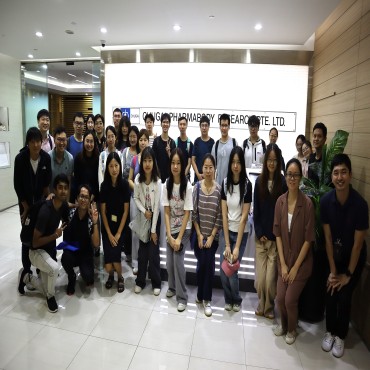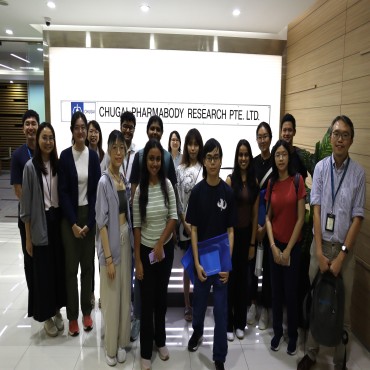Innovation happens when industry and academia come together.
That’s why we were honoured to participate in a guest lecture series for the National Universtity of Singapore’s Master of Science in Biotechnology programme – a dynamic course designed to equip future biotech leaders with both technical expertise and practical know-how. Most notably, it fosters strong engagement with industry players – something we are proud to support.
As part of this, our team was invited to share insights directly with students through two guest lectures and an in-depth industry visit.
On 4 April 2025, Dr Feng Shu, PhD, Researcher Manager from our Automation & Data Management and Lead Optimization Units, delivered a lecture titled Recycling® and Sweeping® antibody technology. She shared how these innovative antibody technologies have enabled the targeting of previously untargetable antigens and how this has been used to develop novel drugs to treat diseases.
Following this, on 8 April 2025, Dr Eric Ng, a Senior Scientist from our Lead Optimization Unit presented a session on ‘Bispecific and Multi-Specific antibody technology’. He introduced students to exciting developments in therapeutic development and walked the class through how these monoclonal antibodies can bind multiple targets at the same time, increasing therapeutic potential. This technology has led to advancements in the treatment options in oncology and immunology.
To reinforce the connection between classroom learning and the real-world, we also hosted an on-site industry visit to our company on 11 April 2025. After an introduction to what we do, the students visited our labs, gaining firsthand exposure to the equipment and safety protocols that underpin day-to-day research.
The visit wrapped up with a Q&A sessions, with questions asked on our innovation culture and the reality of working in a research environment.
Our ongoing engagement with students has resulted in stronger ties between academia and industry and serves as a clear reminder of the value in working together to advance both education and the future of the biotech industry .




